Photographs: Reuters Raghu Dayal
Following the recommendation of the 10-member William M Ackworth Committee, 1920-21, that "the railways should have a separate budget of their own and assume responsibilities for earning and expending their own income," railway finances were separated from the general government finances in 1924.
Much water has flown down the Yamuna during the last 85 years and more. The very shape of the country, its economy, its industry and commerce, the size and contour of its government, its budget, have undergone a huge transformation.
Today, a separate rail budget is an anachronism. The revenue receipts of the Indian government in 1920-21 aggregated Rs 180 crore (Rs 1.80 billion), excluding those of the railways amounting to Rs 82 crore (Rs 820 million).
A dominant activity then -- indeed the only one of its type and magnitude in the state sector -- railways now have several challengers, and command less than one per cent of the government's revenue receipts and disbursements.
. . .
Why railway budget, ministry must be done away with
Image: Railway Minister Mamata Banerjee.Photographs: Reuters
Today, roads enjoy a prominent share of country's traffic, accounting for almost 70 per cent of freight and over 85 per cent of passenger traffic output. (As late as in 1950-51, Indian Railways carried 89 per cent of India's freight and around 75 per cent of passengers.)
Described by The Economist as a "bizarre system introduced by the British colonial government", the rail budget blurs the dividing line between policy-making and implementation.
The extreme visibility of the rail budget accentuates political predilections. Keen to show a surplus budget, more so to accommodate unremunerative projects, unviable schemes and cross-subsidies, adequate provision is sometimes denied for important requirements like depreciation, safety, pension and development.
For some time, it has also led several of the presiding deities in Rail Bhavan to try and win applause through populist announcements, impairing the viability of the whole system.
. . .
Why railway budget, ministry must be done away with
Photographs: Reuters
It has degenerated into an annual frenzy of profligacy, a sad spectacle of Parliament relishing lists of benediction showered on different regions and constituencies.
It is necessary to recognise the difference between taxes and prices. Railway tariffs are the prices or charges for the services they render.
The Indian Railways Act, 1989, empowers the Central government to fix fares, freight rates and other charges. Even in the old Railways Act, 1890, the government could fix maxima and minima, while local administrations could fix actual rates.
Under the new Act, zonal railway administrations are empowered to quote special rates and contractual freight rates. The convention of seeking Parliament's approval for tariff changes through the Rail Budget could even be a reason for Indian Railway's irrational and debilitating tariff structure.
. . .
Why railway budget, ministry must be done away with
Photographs: Reuters
Likewise, trains have been, and can well be, introduced or extended by routine notifications. At any rate, railways' revenues accrue to the Consolidated Fund of India and the Union Budget includes the rail budget revenues and expenses.
The demands for grants are included in the General Budget, for Parliament's approval of expenditure from the Consolidated Fund.
As long as a separate budget for Indian Railway continues, it must be so drafted and presented that it stimulates interest in, and understanding of, the railways -- issues of its viability, development, sustainability and customer-orientation -- by members of parliament.
The Rail Budget must perforce be a statement of Indian Railway's plans, programmes and strategies. What it must not be is a catalogue of services and surveys, trains and lines, jobs and concessions.
. . .
Why railway budget, ministry must be done away with
Photographs: Reuters
The minister must not lose the opportunity to duly apprise parliament of global transport development strategies revolving round rail revival on grounds of environment, safety, land use, among other things.
The occasion must help Parliament to understand the complexities inherent in the management and operation of this leviathan; it must address important issues which afflict the organisation as much as it must reflect a tangible roadmap for it to traverse, to serve the country, which is now in the maelstrom of rapid transformation.
Indian Railway spends little time and attention appropriately explaining to MPs the grave distortions that have been unnecessarily allowed to creep in -- with freight rates being mindlessly increased time and again because Indian Railway needs resources to fill the gap caused by irrational and persistent retention of low fares, particularly for ordinary short-distance and suburban passenger services.
The budget should explain why Indian Railway's revenue from freight traffic aggregates over two-thirds of gross earnings, although demanding far less than half the capacity and resources, whereas passenger services contribute less than one-third of total earnings.
Whenever compelling considerations of social justice or connectivity of backward regions involve investment and/or operational expenses, parliament must be urged to let Indian Railway be duly compensated by the general exchequer.
. . .
Why railway budget, ministry must be done away with
Photographs: Reuters
The need for a desirable structural re-organisation of Indian Railway has been examined by high-powered expert committees and groups led by political leaders and economists of the eminence of H N Kunzru, K C Pant, and Rakesh Mohan, among others.
Indian Railway's corporatisation was first suggested by the Kunzru Committee as early as in 1947, further emphasised by the KC Pant Committee, and lately re-emphasised by the Rakesh Mohan expert group. Railway development in India was brought about by private companies.
The Railways Act, 1989 has an enabling provision for private rail links being built and opened, subject to certain safety and tariff regulations. If the railways are called upon to find their own resources, why should they be subjected to government pressures and policies?
Why should they not be allowed to offer equity to the market? These are some pertinent fundamental aspects which need to be addressed for healthy nationwide deliberation.
It is not only the validity and justification of a separate Rail Budget that needs to be closely examined, but also the existence of a separate railway ministry.
. . .
Why railway budget, ministry must be done away with
Photographs: Reuters
A steady global emphasis on integrated logistics and seamless supply chains, involving an imperative need for intermodal coordination and complementarity, would clearly show the anachronism of separate nodal ministries.
The practice -- followed during the tenure of Prime Minister Rajiv Gandhi -- of having different departments dealing with railways, ports, shipping and roads under the umbrella of a ministry of transport needs to be revived.
That is how most countries the world over manage and administer their transport sector. A climate for change is, of late, discernible.
The time seems to be opportune for doing away with the anachronism of a separate rail budget, which has lulled railwaymen here into an emotional rut, the prospect of escape from which looks fearful to them.
Little do they realise that their obsession for separation has kept them separated from the economic mainstream.

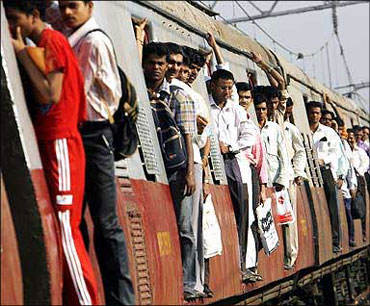
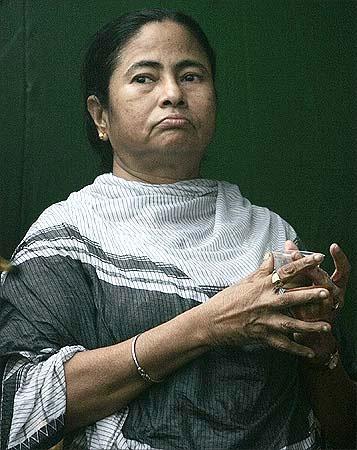
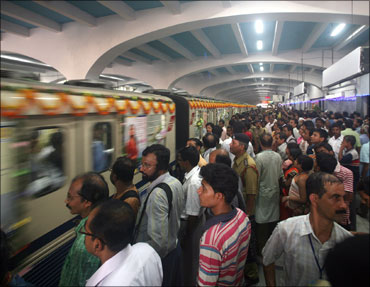
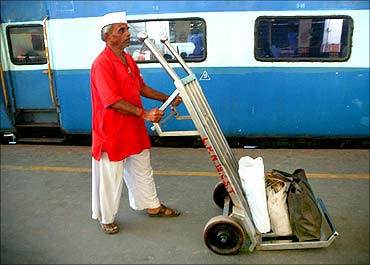
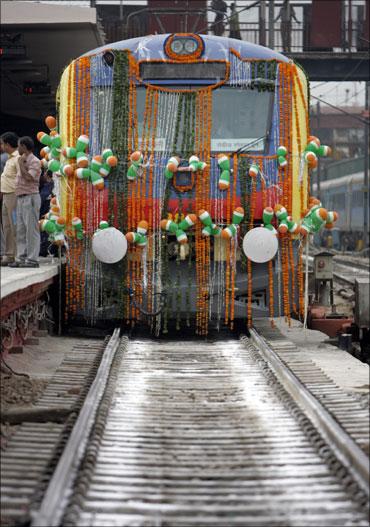
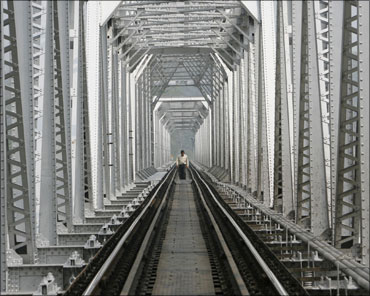
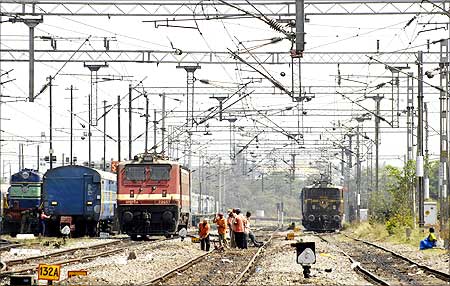

article